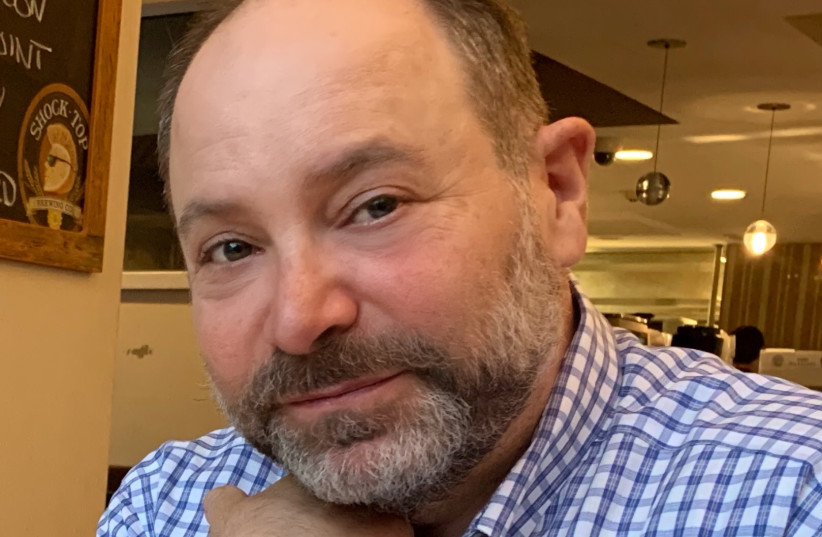Fantasy fans of The Lord of the Rings or Harry Potter may have wondered why an epic cinematic Jewish fantasy novel hasn’t come around. Wonder no more.
About 12 years ago, Michael Weingrad in the Jewish Review of Books asked why there was no Jewish Narnia. (The Chronicles of Narnia is a fantasy series that uses Christian themes.)
Mark Levenson said his debut novel The Hidden Saint is in a way a response to that, though he’d begun writing before he saw the article. Levenson’s book is a startlingly gripping tale about a rabbi named Adam, who has the help of a golem he creates, a magic mirror and an old woman who is more than meets the eye. They must fight against the sharp teeth of monsters that come from the ground, Cossacks on horseback who swing their swords and – the toughest of all – the Demon Queen, Lilith.
While it’s every groom’s nightmare to forget his wedding ring at home, things get much worse for Adam and it looks like he might be defeated by evil. But he realizes he must find one of the Lamed Vavnicks, one of the 36 saints or righteous people who will help him defeat evil. Children and those getting married are especially vulnerable to becoming prey to the dark side.
The story takes place in Lizhensk, Poland, in the 1770s, where magic is real, and he must journey to save the life of a loved one who has been kidnapped.

One of Levenson’s best scenes is a haunting one where he describes the pain of ghosts who are living out their same days over and over again, and Adam realizes he may be able to help them.
The story is such a page-turner I read it in one night. If I were a gambling man, I would bet my money that The Hidden Saint will be made into a film. In an interview with the Magazine, Levenson, who is from White Plains, New York, said he would not get ahead of himself but in the event the book became a movie, he could see Tom Hiddleston or Alan Cumming in the role of Adam, and Nicole Kidman in the role of the Demon Queen.
Levenson, who has written Jewish fantasy for the stage and in short fiction, never before wrote a novel. He said he’s worked on it on and off for 12 years.
Levenson told a horrific tale of what happened to his grandfather’s uncle in Russia many years ago. He said his ancestor was a strongman and had an act where horses would be tied up to his arm and they would try to run and he would not let them rip his arms off. In another act, he would lie down and a boulder would be placed on his stomach and someone would hit it with a sledgehammer and he would be fine.
“Sadly, some drunken peasant missed the rock and got him and they put him in a cart and tried to bring him to the hospital, but he was dead before he got there,” Levenson said.
While there are numerous Jewish references including phrases such as “If there is no flour (bread) there is no Torah” and some mitzvot or good deeds are performed, this book has no knowledge prerequisite so it will appeal not only to Jews but to anyone who likes a good story and wants to see if this rabbi can figure out his sin, atone for it and defeat the evil antagonist. One of the enemies is the Yedoni, monsters that look identical and spring from the ground to kill.
Though there are some kabbalistic references in passing such as how Elisha ben Abuya became an apostate after studying kabbalah, Levenson said he has not studied kabbalah and is thankful to his nice Jewish mother who “schlepped across Long Island” to get him a large map of Middle Earth from The Lord of the Rings.
Levenson said he hopes readers take away the message that in this wild world “we have more control over our lives than we think we do.”
In a pivotal scene where Adam confronts Lilith, he tells her she has no power over him.
“All of you act on what is in your hearts,” Lilith tells him. “I just make it easier for you to do so.”
Levenson mentioned that it’s possible Mary Shelly had heard about the golem and it could have influenced her writing of Frankenstein.
Jonathan Kellerman and Helene Wecker are talented writers that employ Jewish fantasy but not in such a world. The Hidden Saint is a fabulous book that picks you up and takes you on a whirlwind of a ride through Jewish myths, well-developed characters and a climactic battle between good and evil. The 355 pages feel like 200.
As for the writing process, Levenson said he ran into one hiccup.
“The book and I had a fight,” he said.
It is clear the author won the battle.
